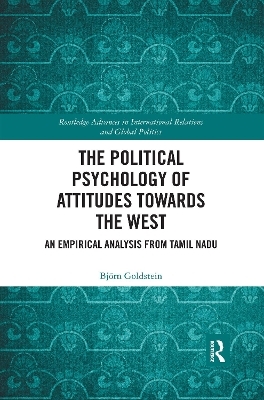
The Political Psychology of Attitudes towards the West
An Empirical Analysis from Tamil Nadu
Seiten
2020
Routledge (Verlag)
978-0-367-59353-7 (ISBN)
Routledge (Verlag)
978-0-367-59353-7 (ISBN)
Why do some individuals from the imagined "non-West" view the "West" favorably and others do not? Grounded in psychological authoritarianism and the psychological reactions to experiences of rejection, Björn Goldstein provides a theoretical model to explain and predict attitude toward the "West."
Why do some individuals from the imagined "non-West" view the "West" favorably and others do not?
Grounded in psychological authoritarianism and the psychological reactions to experiences of rejection, Björn Goldstein provides a theoretical model to explain and predict attitude toward the "West." Using accounts from high-ranking politicians from different socioeconomic groups in the Tamil Nadu region of India—a region independent from the often too "emotionalized" discourse regarding (political) Islam—Goldstein challenges the conventional narrative that the most important factors for attitude formation toward the West are experiences of disregard and oppression perpetrated by the West.
Far beyond the personal characteristics of individuals, differences in attitudes follow a regular pattern of variables influencing opinion and attitude formation toward the West in each society. Scoring high on authoritarianism predicts "anti-Western" attitudes far better than socio-economic status, cultural or moral concerns, or normative differences do.
Why do some individuals from the imagined "non-West" view the "West" favorably and others do not?
Grounded in psychological authoritarianism and the psychological reactions to experiences of rejection, Björn Goldstein provides a theoretical model to explain and predict attitude toward the "West." Using accounts from high-ranking politicians from different socioeconomic groups in the Tamil Nadu region of India—a region independent from the often too "emotionalized" discourse regarding (political) Islam—Goldstein challenges the conventional narrative that the most important factors for attitude formation toward the West are experiences of disregard and oppression perpetrated by the West.
Far beyond the personal characteristics of individuals, differences in attitudes follow a regular pattern of variables influencing opinion and attitude formation toward the West in each society. Scoring high on authoritarianism predicts "anti-Western" attitudes far better than socio-economic status, cultural or moral concerns, or normative differences do.
Björn Goldstein is a lecturer in the Institute of Political Science at the University of Münster, Germany.
1. Introduction 2. The Relevance of Studying Attitudes Towards the "West" for International Relations Research 3. Anti-"Western" and Pro-"Western" Attitudes: A Theoretical Approach 4. Probing the Theoretical Model: A Qualitative Approach 5. Seven interviewees’ Attitudes towards the "West": Analysis and Comparison 6. Discussion 7. Conclusion
| Erscheinungsdatum | 01.07.2020 |
|---|---|
| Reihe/Serie | Routledge Advances in International Relations and Global Politics |
| Verlagsort | London |
| Sprache | englisch |
| Maße | 152 x 229 mm |
| Gewicht | 358 g |
| Themenwelt | Geisteswissenschaften ► Philosophie |
| Sozialwissenschaften ► Politik / Verwaltung ► Europäische / Internationale Politik | |
| Sozialwissenschaften ► Politik / Verwaltung ► Politische Theorie | |
| ISBN-10 | 0-367-59353-X / 036759353X |
| ISBN-13 | 978-0-367-59353-7 / 9780367593537 |
| Zustand | Neuware |
| Haben Sie eine Frage zum Produkt? |
Mehr entdecken
aus dem Bereich
aus dem Bereich
Studienbuch
Buch | Hardcover (2023)
De Gruyter Oldenbourg (Verlag)
44,95 €
erfolgreiche Interessenvertretung durch Prozesskompetenz im komplexen …
Buch | Hardcover (2023)
Wiley-VCH (Verlag)
42,00 €


